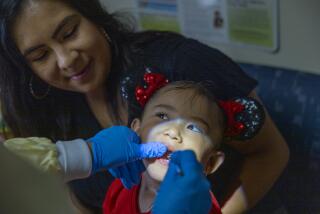Dentist Filling a Need : Health: Dental care for the disabled poses special problems, but one professional seeks such patients.
- Share via
ANAHEIM — Dr. Jerry Minsky worked quickly on his patient in the Kaiser Permanente Hospital operating room here recently, quietly giving instructions to his anesthetist and two nurses as machines beeped and buzzed.
*
Such a setting may be typical for a heart or brain surgeon, but not for a dentist simply cleaning or filling teeth.
But Minsky is not your typical dentist. He is the only one in Southern California whose clinic targets people with disabilities, according to the California Dental Assn.
The 37-year-old Anaheim Hills resident, who works out of his clinic in the Los Cerritos Mall and at 10 local hospitals, sees 600 disabled patients annually, representing about half his practice. Their disabilities include mental retardation, cerebral palsy, autism, Parkinson’s disease and severe arthritis, he said. Their ages range from 2 to 95 years.
Parents of and organizations for the disabled say it is difficult to find dentists willing to take on such patients.
“It is a major problem to locate a dentist,” said Joanne Miner, executive director of United Cerebral Palsy of Orange County. “You have to find a dentist who is comfortable working with a patient who has special problems.
“To be honest,” she said, “a lot of our people just go without dental care and their oral hygiene often needs a lot of work. They frequently lose teeth, then they can’t chew properly, and that means they can’t get the proper nutrition.”
Many of his disabled patients “have lost their teeth on their own before they even see us,” Minsky said. “For others, their teeth are so loose or diseased by the time we see them, we have to pull them.”
Minsky uses operating rooms and general anesthesia because many of his patients are unable to hold their mouths open voluntarily for long periods or are difficult to control. Given that situation, even the most routine dental procedure can be dangerous for a person with disabilities, Minsky said.
“Many of (the disabled) have overlying medical problems with their hearts or with something else, and we have to make sure those are adequately addressed before we treat the patient,” Minsky said. “That’s why I do a lot of the work in a hospital, because there are people available who have acute emergency medical training.”
Marge Thompson, a Laguna Beach resident, said she searched for a long time before finding Minsky, who treats her son Gary, 25, who is autistic.
“I applaud what he does because it is not easy to deal with someone like my son,” Thompson said. She said her son must be taken to the hospital and anesthetized for even the most minor dental work. “He would probably kick the doctor or bite him if he wasn’t put to sleep.”
Minsky, who received his undergraduate degree at Cal State Fullerton and his dental training at Georgetown University in Washington, began seeing patients with disabilities on a regular basis in 1986, four years after he left dental school.
“A nursing home that had several mentally retarded patients was calling every dentist in the phone book trying to find someone to treat their patients,” Minsky said. “These were patients who would need hospital care. I had hospital operating training, and I always enjoyed it, so I took the patients. That led to some referrals to some government agencies and a lot of word of mouth.”
Dental treatments for the disabled are costly, but Minsky says he is not getting rich doing it. Most disabled people’s dental insurance is through the state Medi-Cal program, which pays only 25% as much as private insurers, Minsky said.
He said he is trying to reach out to younger people with disabilities, because if their problems become so advanced that the teeth must be pulled, the teeth cannot be replaced. Fitting a disabled person with dentures is rarely an option, he said.
“Because of their limited dexterity, disabled patients have a tough time putting dentures in properly,” Minsky said. “And if the dentures dislodge, they can lodge in the back of the patient’s throat. If the person can’t reach back there and get them out, they can suffocate and die.”
Treating the patients before serious problems arise, he said, results in happier patients who can lead healthier lives.
More to Read
Sign up for Essential California
The most important California stories and recommendations in your inbox every morning.
You may occasionally receive promotional content from the Los Angeles Times.













